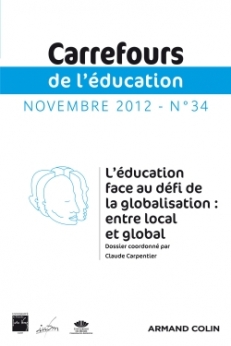
Carrefours de l'éducation n° 34 (2/2012)
Pour acheter ce numéro, contactez-nous
Recevez les numéros de l'année en cours et accédez à l'intégralité des articles en ligne.
Émile ou de l’éducation pose un problème d’interprétation dans le rapport qui s’établit, dès la préface de l’ouvrage, entre l’injonction d’une solide connaissance positive du sujet à éduquer et l’évocation d’un « système » qui prend la forme de « rêveries d’un visionnaire sur l’éducation ». Cette disjonction, encore accentuée par la rupture que marque Rousseau entre « la bonté absolue du projet » et son exécution dans des conditions toujours particulières, a compliqué la démarche de ceux qui ont voulu s’engager dans sa suite. Ce fut le cas des artisans de l’éducation nouvelle au coeur du « creuset des sciences de l’éducation » que fut Genève dans la première moitié du xxe siècle: la constitution d’une « science de l’enfant » n’a pas cessé d’interférer, chez eux, avec une visée « humaniste » qui a le plus souvent pris la forme d’une militance, et qui est demeurée la tache aveugle de la pensée éducative. Et le passage aux « sciences de l’éducation » n’a pas fait disparaître la problématique. C’est à éclairer philosophiquement la dimension « humaniste », dans son rapport avec la « scientifique », et à articuler les deux dans une épistémologie de la pédagogie qui pourrait encore trouver actuellement son utilité, que s’emploie cet article.
Emile or On Education poses a problem for interpretation concerning the relationship established right from preface of the book between enunciation of a sound positive knowledge of the subject to educate and the evocation of a “system” which takes the form of “starry-eyed dreams of a visionary about education”. This dicotomy, more accentuated still by the break Rousseau marks between “the pure goodness of the scheme” and its implementation in conditions that are always quite particular, has complicated the task of those who wanted to engage themselves in following it through. This was the case of the artisans of the New Education at the very heart of the “crucible of the sciences of education” that Geneva was in the first half of the xxth C entury: for these artisans, the establishment of a “science of the child” did not cease to interfere with a “humanist” aim which most often took the form of militancy, and which has remained the blind spot of educational thinking. And the transition to the “sciences of education” has not made the problem disappear. This article seeks to philosophical clarification of the “humanist” dimension in its relationship with the “scientific”, and to link the two in a epistemology of teaching which could still be useful today.